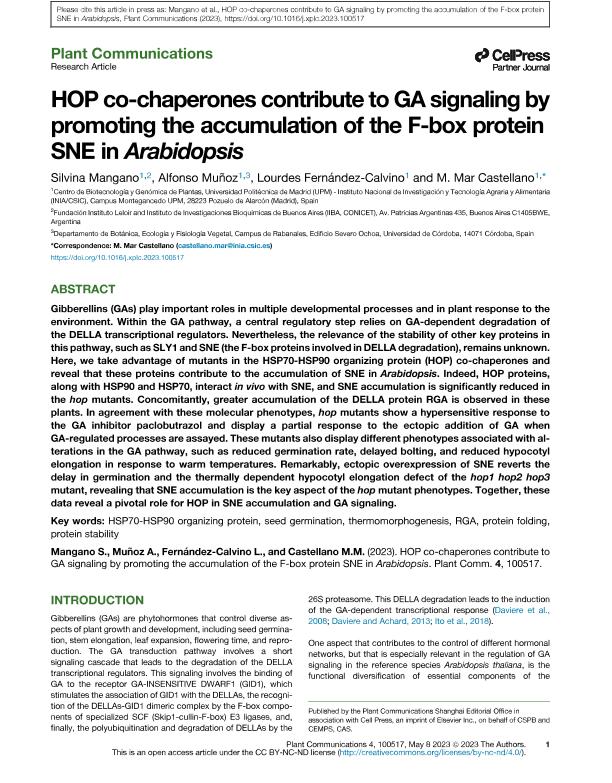Artículo
HOP co-chaperones contribute to GA signaling by promoting the accumulation of the F-box protein SNE in Arabidopsis
Fecha de publicación:
05/2023
Editorial:
Cell Press
Revista:
Plant Communications
ISSN:
2590-3462
Idioma:
Inglés
Tipo de recurso:
Artículo publicado
Clasificación temática:
Resumen
Gibberellins (GAs) play important roles in multiple developmental processes and in plant response to the environment. Within the GA pathway, a central regulatory step relies on GA-dependent degradation of the DELLA transcriptional regulators. Nevertheless, the relevance of the stability of other key proteins in this pathway, such as SLY1 and SNE (the F-box proteins involved in DELLA degradation), remains unknown. Here, we take advantage of mutants in the HSP70-HSP90 organizing protein (HOP) co-chaperones and reveal that these proteins contribute to the accumulation of SNE in Arabidopsis. Indeed, HOP proteins, along with HSP90 and HSP70, interact in vivo with SNE, and SNE accumulation is significantly reduced in the hop mutants. Concomitantly, greater accumulation of the DELLA protein RGA is observed in these plants. In agreement with these molecular phenotypes, hop mutants show a hypersensitive response to the GA inhibitor paclobutrazol and display a partial response to the ectopic addition of GA when GA-regulated processes are assayed. These mutants also display different phenotypes associated with alterations in the GA pathway, such as reduced germination rate, delayed bolting, and reduced hypocotyl elongation in response to warm temperatures. Remarkably, ectopic overexpression of SNE reverts the delay in germination and the thermally dependent hypocotyl elongation defect of the hop1 hop2 hop3 mutant, revealing that SNE accumulation is the key aspect of the hop mutant phenotypes. Together, these data reveal a pivotal role for HOP in SNE accumulation and GA signaling.
Archivos asociados
Licencia
Identificadores
Colecciones
Articulos(CCT - LA PLATA)
Articulos de CTRO.CIENTIFICO TECNOL.CONICET - LA PLATA
Articulos de CTRO.CIENTIFICO TECNOL.CONICET - LA PLATA
Articulos(IIBBA)
Articulos de INST.DE INVEST.BIOQUIMICAS DE BS.AS(I)
Articulos de INST.DE INVEST.BIOQUIMICAS DE BS.AS(I)
Citación
Mangano, Silvina; Muñoz, Alfonso; Fernández Calvino, Lourdes; Castellano, M. Mar; HOP co-chaperones contribute to GA signaling by promoting the accumulation of the F-box protein SNE in Arabidopsis; Cell Press; Plant Communications; 4; 3; 5-2023; 1-14
Compartir
Altmétricas




